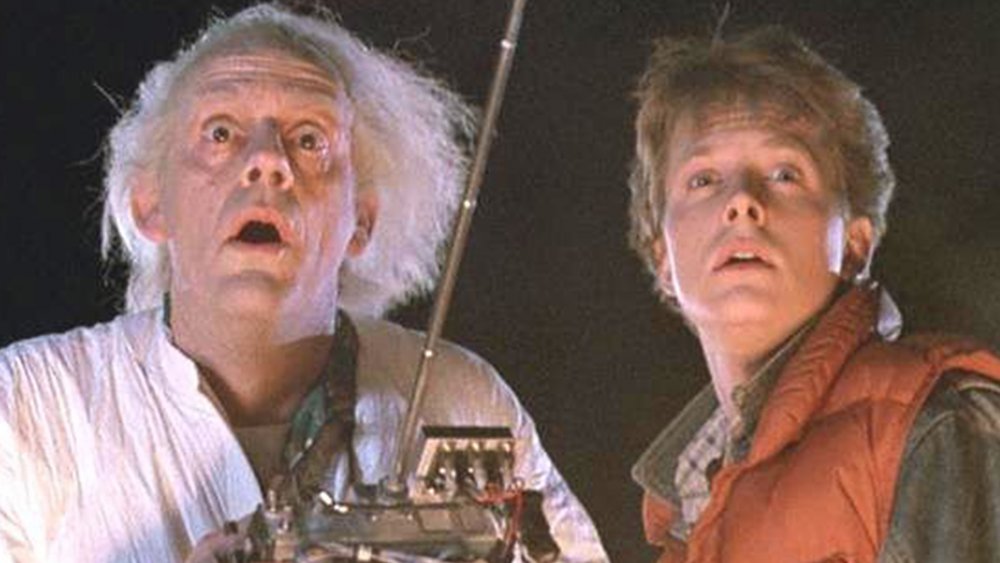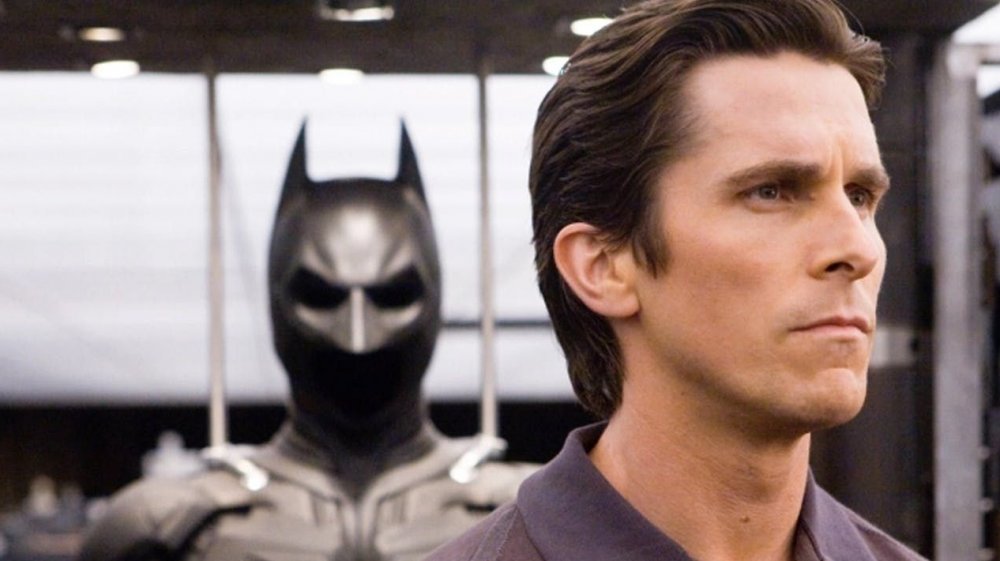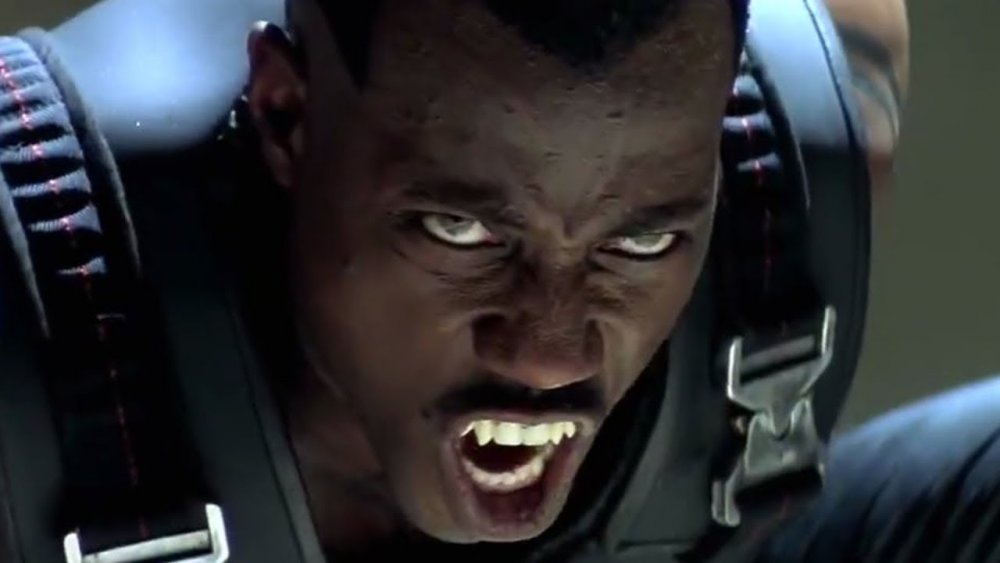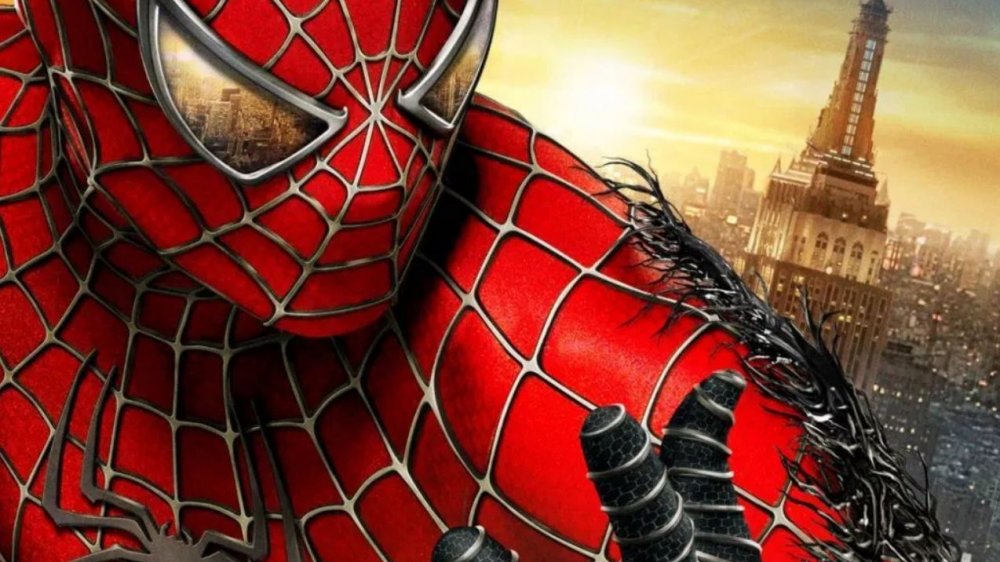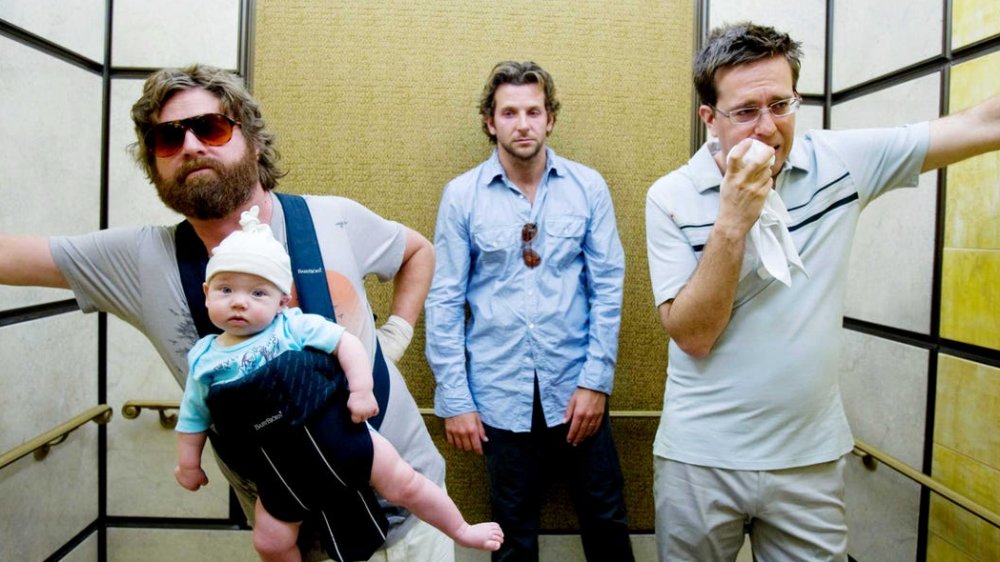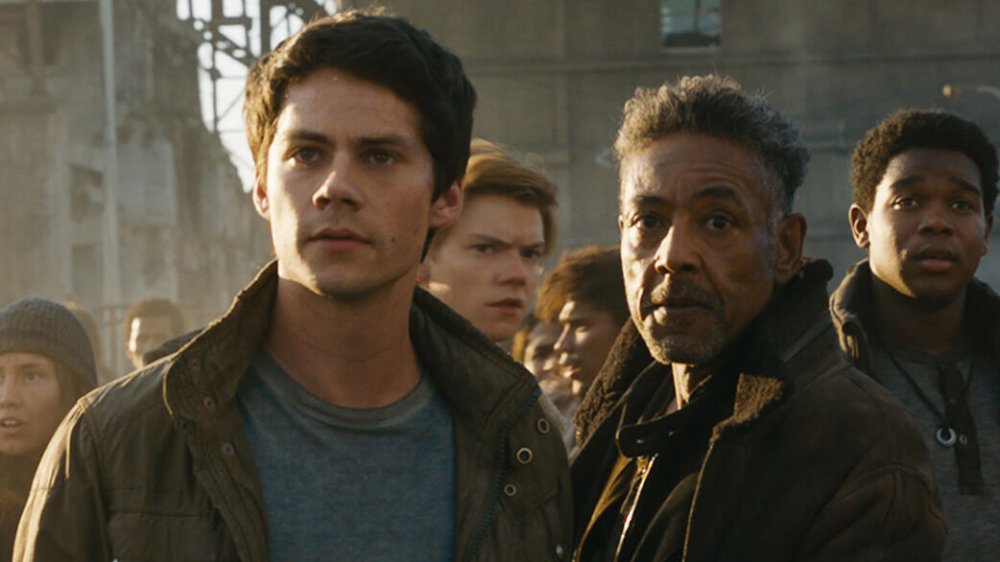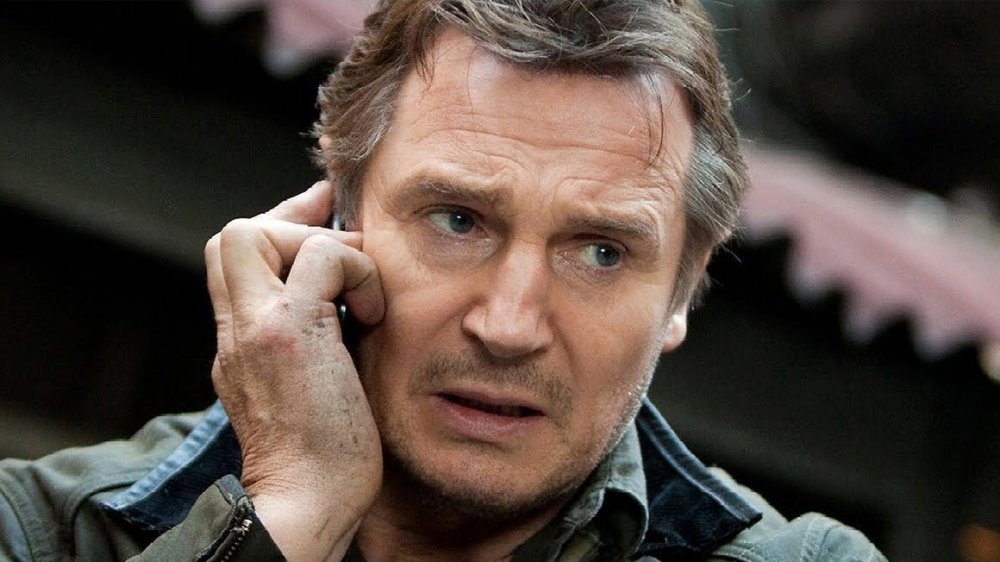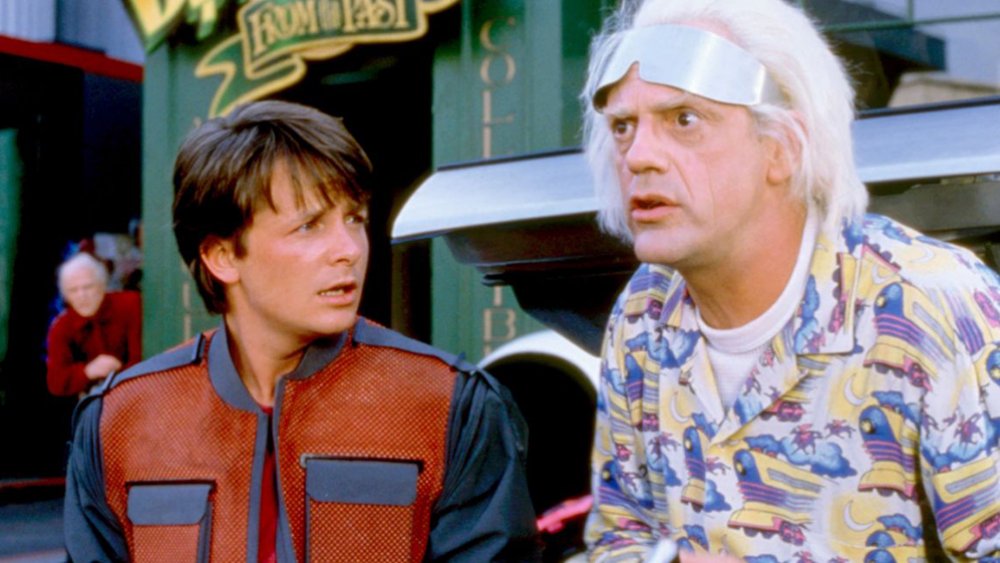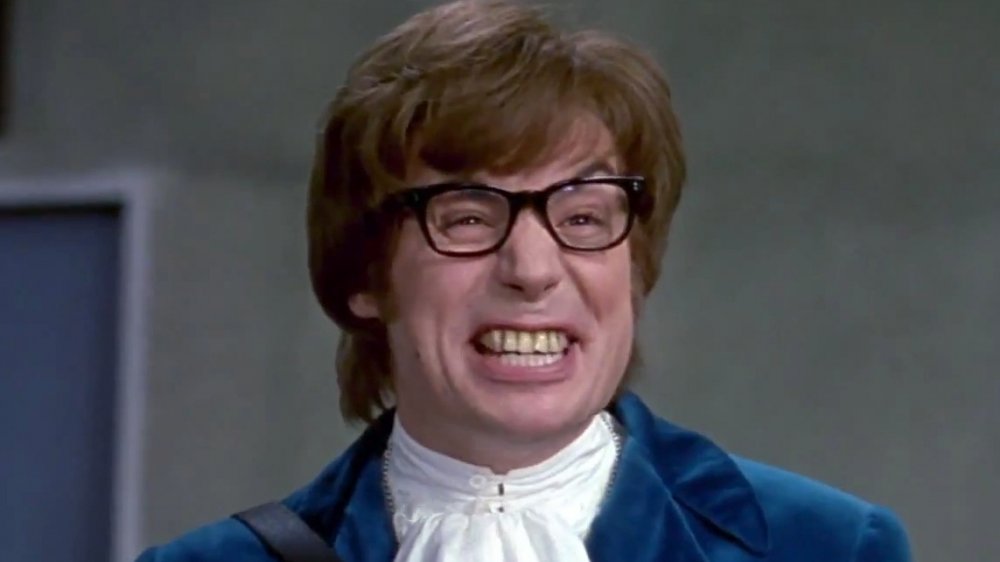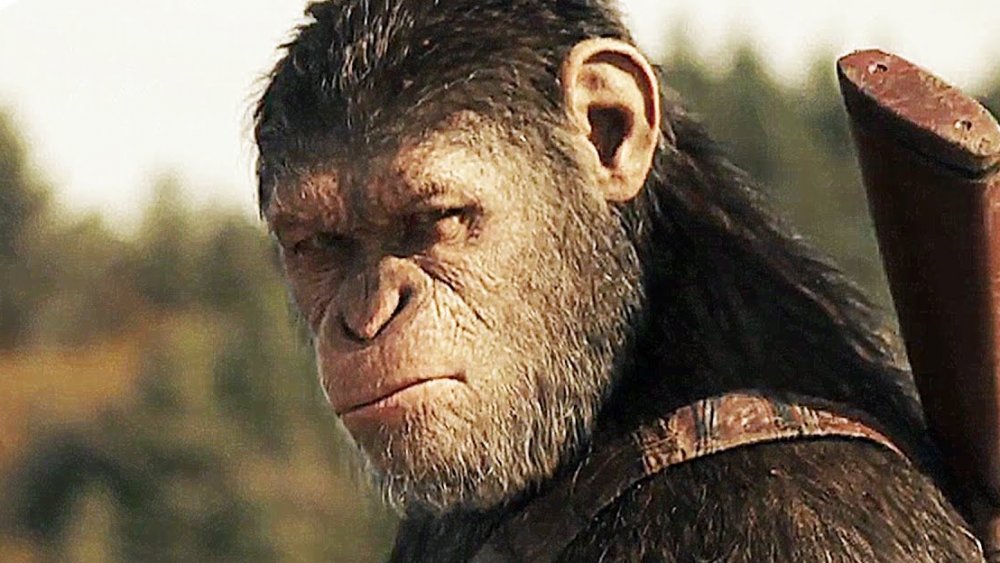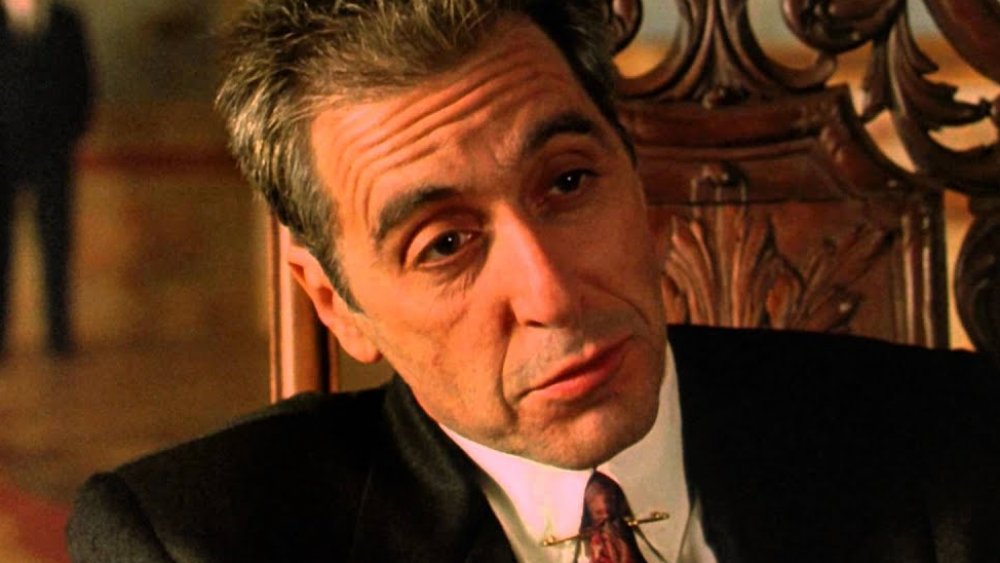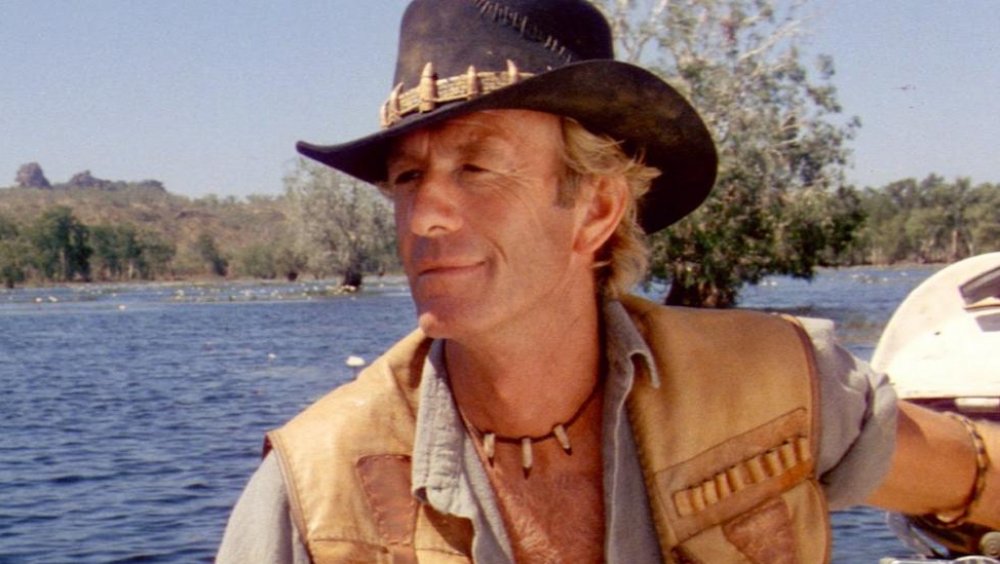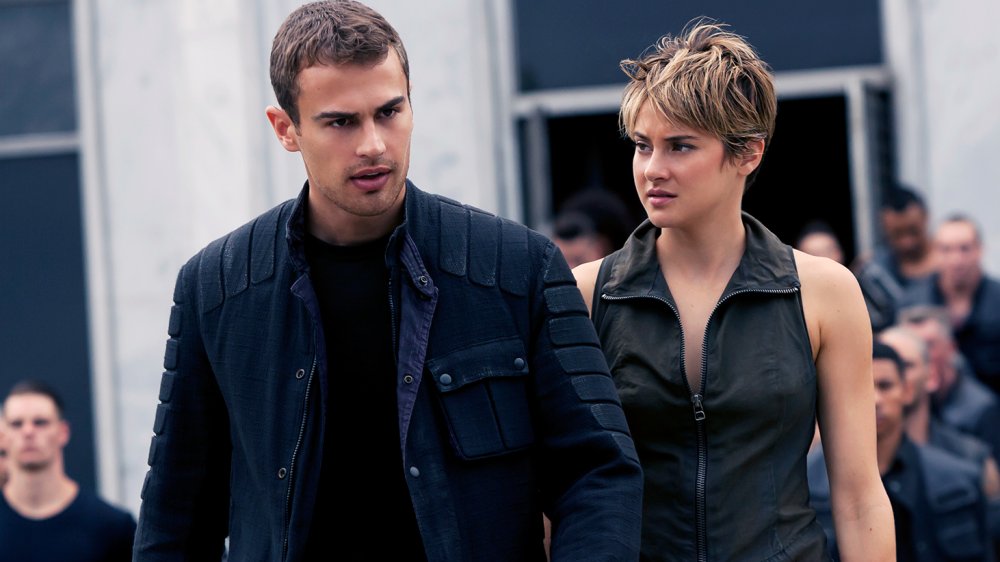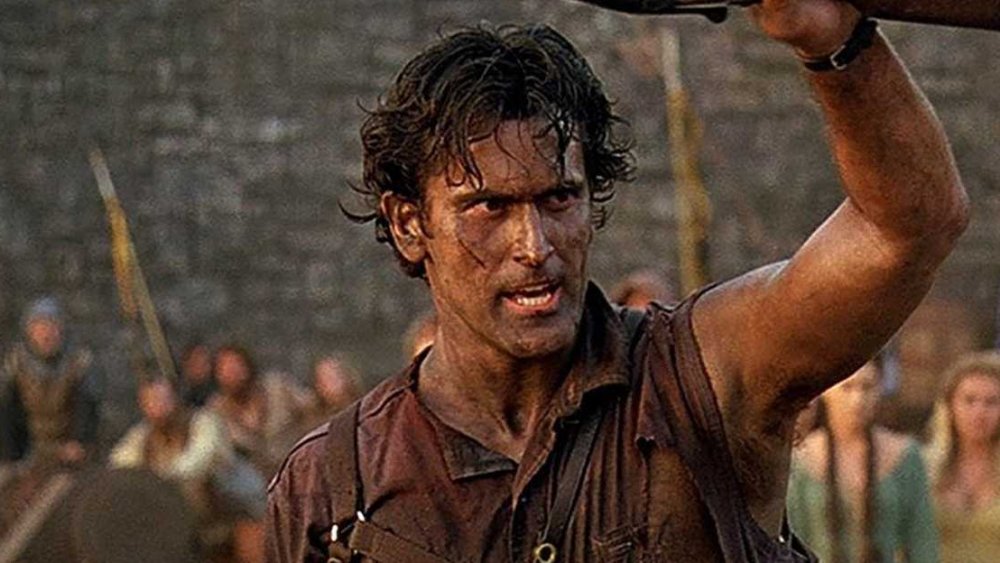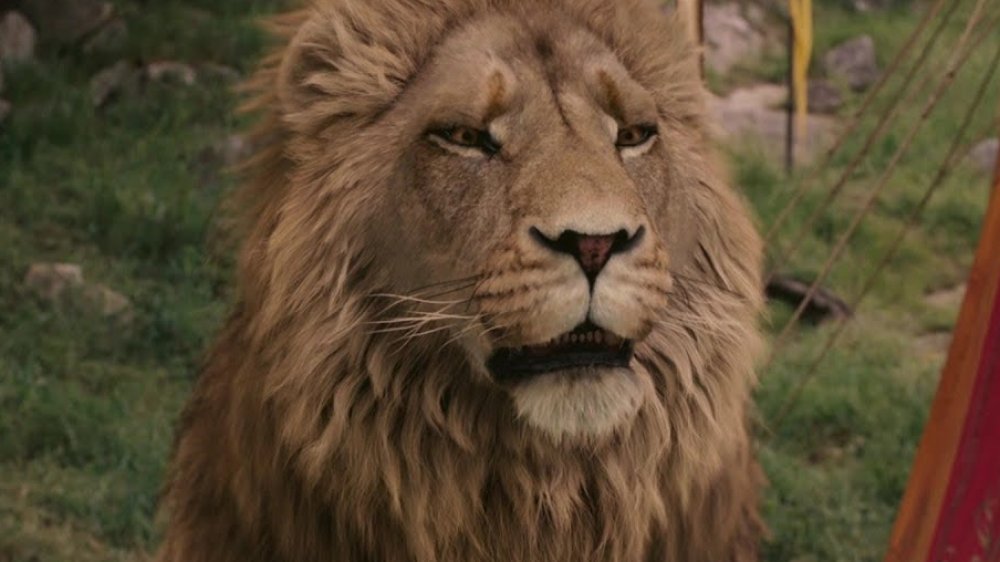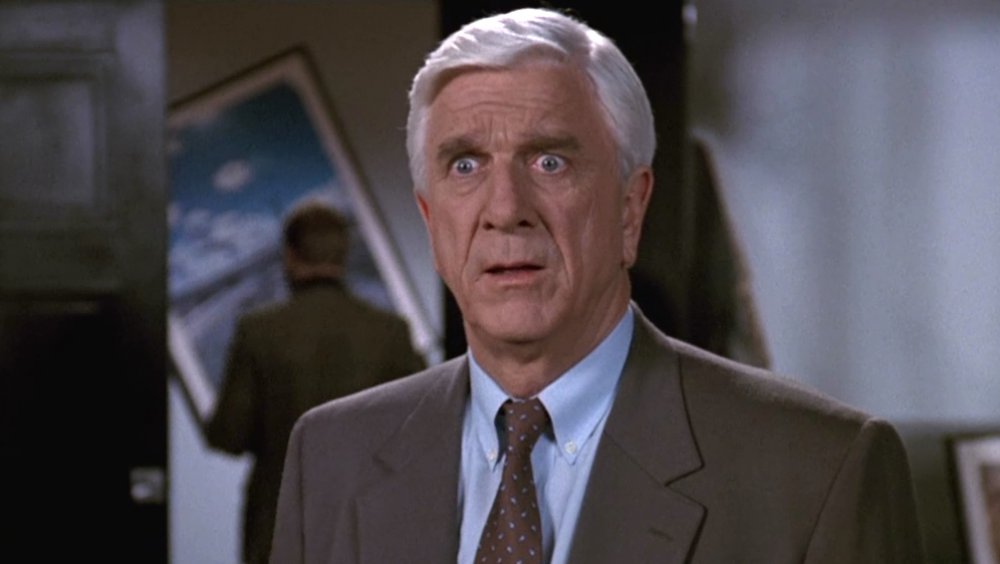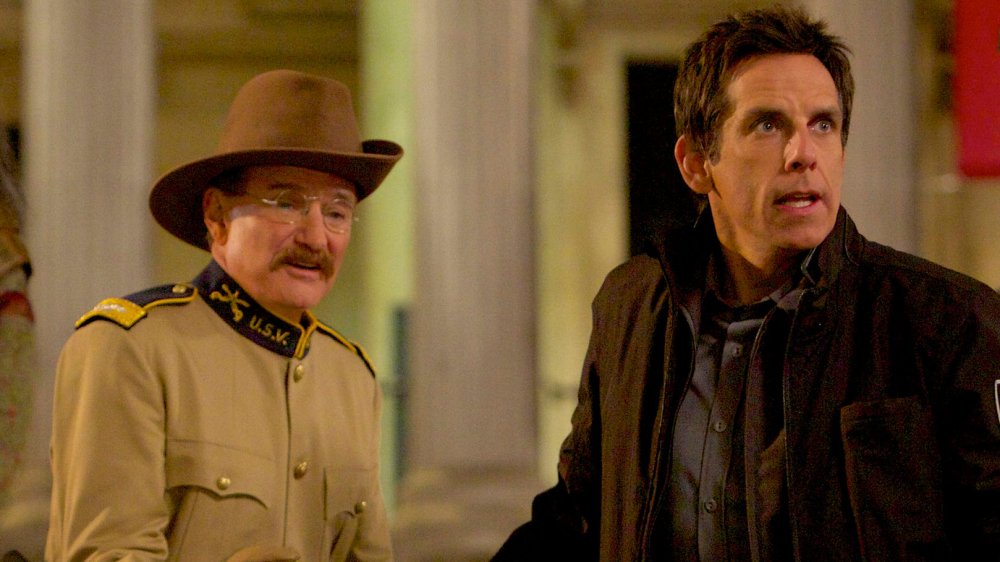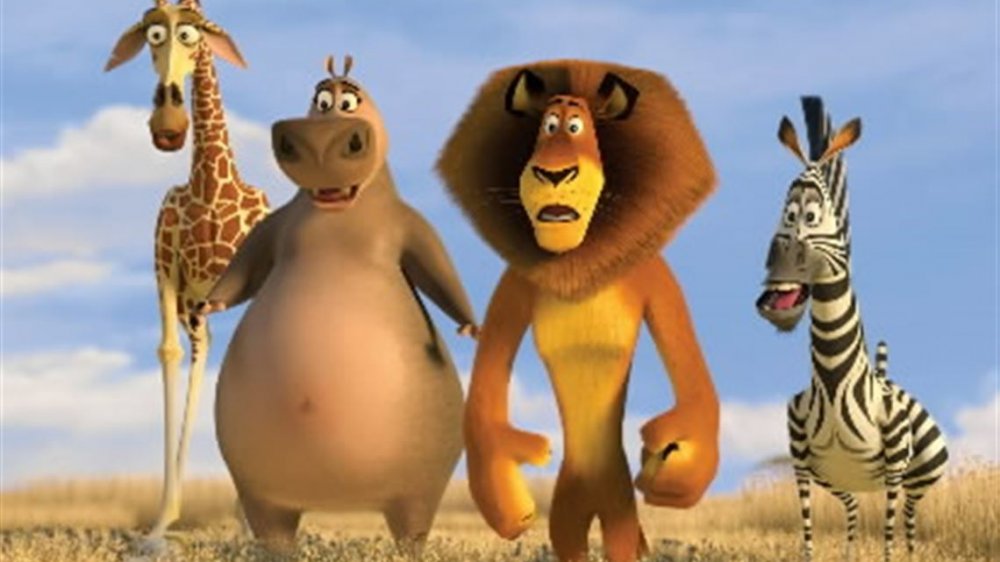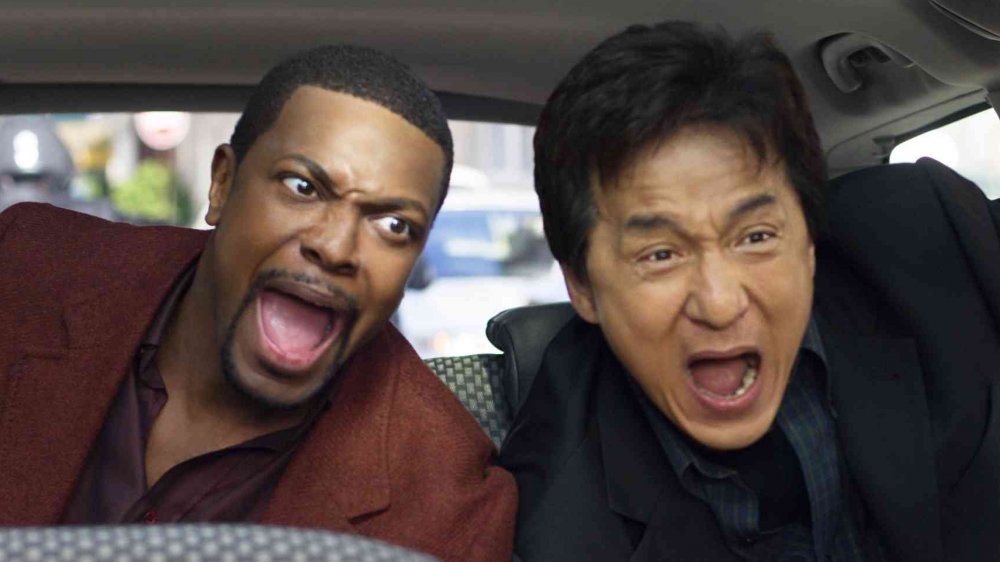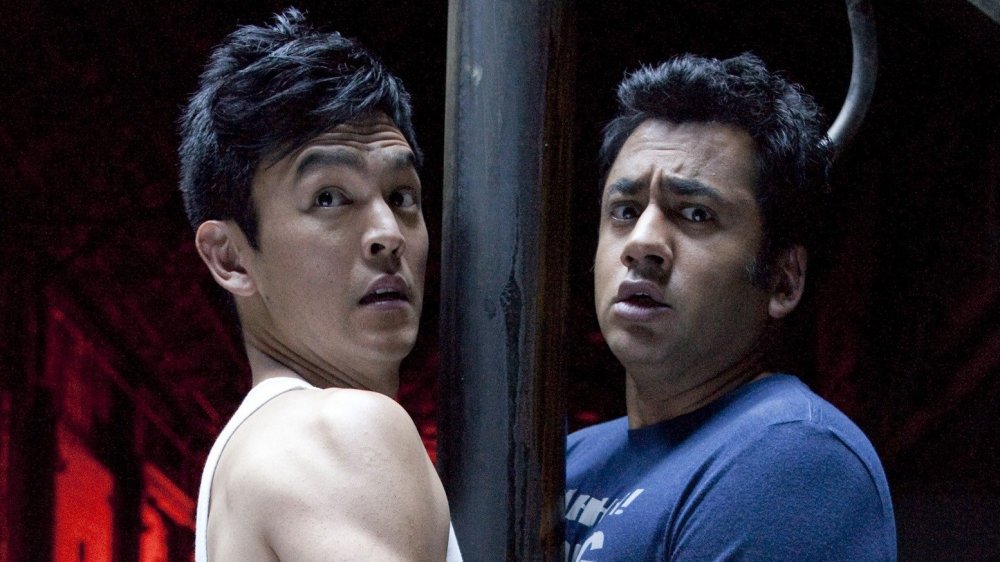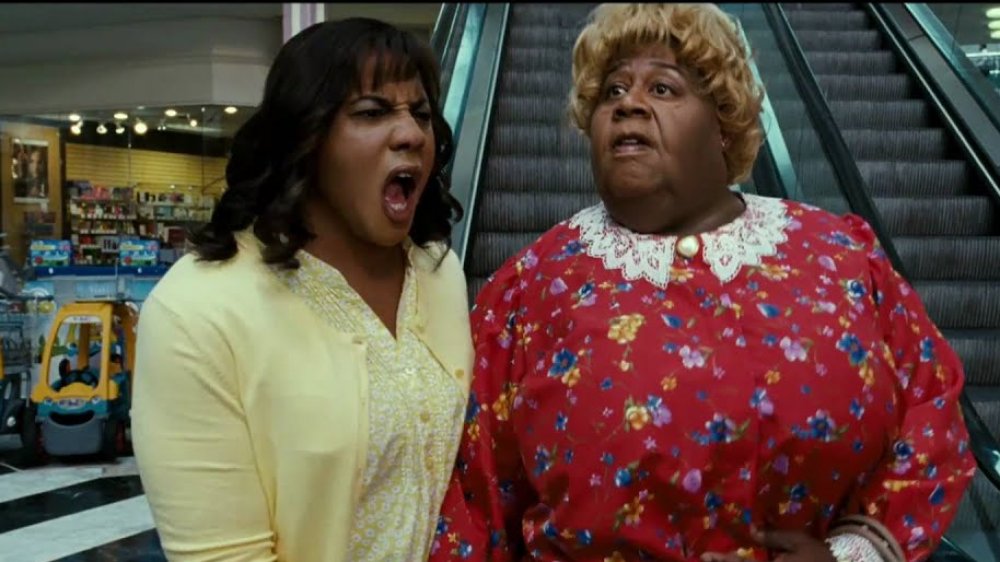The Real Reason These Trilogies Never Had A Fourth Movie
Long-running movie franchises with a half dozen entries or more are common — consider Star Trek, A Nightmare on Elm Street, and Police Academy. It's hard to sustain plots (and the interest of paying audiences) for that long, so Hollywood is much more likely to churn out trilogies. There are dozens of classic movie series delivered in three carefully constructed and plotted installments, including Peter Jackson's The Lord of the Rings, the original Star Wars, and the first X-Men series. The enduring blockbuster success of trilogies more often than not invites serious discussion of more movies, which can lead to spinoffs featuring breakout characters, or offshoots to build a cinematic universe. But sometimes creators comply, and find another story to squeeze a bit more life out of a concept. Results may vary — Toy Story 4 was critically acclaimed, while Jaws IV was decidedly not. If filmmakers ever score a three-peat, a part four is almost always on the table. Here are some of the biggest trilogies in movie history, and just why nobody ever made that fourth film.
The Dark Knight trilogy was meant to be a trilogy
Christopher Nolan reinvented Batman — and the superhero movie genre itself — with his Dark Knight trilogy. The first movie, Batman Begins, showed how Bruce Wayne became a brooding vigilante fighting crime in the streets of Gotham City, The Dark Knight had Batman facing off against the extremely frightening and psychologically twisted Joker (a role which won the late Heath Ledger an Academy Award), and it all came to a conclusion — with Wayne moving on — in The Dark Knight Rises. The combination of visionary director and Batman proved irresistible for moviegoers: The trilogy earned a combined $2.4 billion at the box office for studio Warner Bros., and the demand for more Batman by Nolan movies was there, but Nolan didn't have an interest. His carefully mapped out trilogy told a complete story. "When they inevitably came to us and said, 'How about a No. 4? I said, 'No. We have to stick to Chris's dream,'" star Christian Bale told the Toronto Sun. "'Which was always to, hopefully, do a trilogy. Let's not stretch too far and become overindulgent and go for a fourth."
Blade went from killing vampires to filing lawsuits
In 1998, a decade before the Marvel Cinematic Universe kicked off with Iron Man, one of the first movies based on a Marvel property hit theaters. That film was Blade, starring Wesley Snipes as Eric Brooks, a.k.a. Blade, a "daywalker" half-vampire who hunts down and kills bad guy vampires. Comic book movies weren't yet massive moneymakers, but Blade earned $70 million for New Line Cinema, who let Blade 2 loose in 2002. That was a hit, too, leading to the third chapter, Blade: Trinity... which earned a relatively paltry $52 million. According to /Film, the poor performance of the third Blade led New Line to call off plans for another sequel, plus a spinoff about the "Nightstalkers" portrayed in Trinity by Ryan Reynolds and Jessica Biel. Another nail in the coffin for that film about the dead: Snipes sued New Line, alleging that the company didn't pay him his contracted amount. That legal battle went on for so long that New Line's rights to the Blade characters expired and returned to Marvel, which has a Blade reboot starring Mahershala Ali in the works.
Spider-Man 4 couldn't deliver
After years of sitting idle while Superman and Batman got the summer blockbuster treatment, Spider-Man arrived in 2002, directed by Sam Raimi and starring Tobey Maguire as teen photographer Peter Parker turned masked webslinger. After it snagged $821 million at the world box office, Spider-Man 2 flew along in 2004, earning almost as much and enjoying widespread acclaim, making it one of the most praised superhero movies ever made. Spider-Man 3 proceeded in 2007, and although it was a little messy and overpopulated with villains and side characters, it still financially outperformed the other two movies.
Spider-Man 4 was a foregone conclusion to the point where it wasn't just an idea — it advanced far into production. Maguire negotiated a deal to return (earning $50 million if Spider-Man 5 shot immediately after), John Malkovich and Anne Hathaway looked to join as bad guy Vulture and love interest Felicia Hardy, respectively, and by late 2009, screenwriter Gary Ross had nearly finished a script. Everything was falling in place for Spider-Man 4 to actually start filming in early March 2010, with a Sony-announced theatrical release date of May 6, 2011. But in January 2010, Deadline broke the bad news: Raimi, believing that he'd be unable to make a good movie in that truncated timeframe, quit the project. Sony, in turn, canceled Spider-Man 4 altogether, and then announced that it would just reboot the whole thing for the summer of 2012.
The cast got over their Hangover
There had never been anything quite like The Hangover. The 2009 film was as raunchy as comedies get, but it was also a buddy movie, and a mystery — three guys, smooth Phil (Bradley Cooper), nerdy Stu (Ed Helms), and weirdo Alan (Zach Galifianakis) wake up in Las Vegas the morning after the most epic bachelor party of all time, remembering nothing and the groom (Justin Bartha) gone missing. Director Todd Phillips (Old School, Joker) caught something magic, and audiences loved it — The Hangover became the highest-grossing R-rated comedy of all time, and elevated Cooper and Galifianakis to the A-list.
Then Hollywood tried to repeat the formula, not once but twice, as if the events of that crazy night could ever feasibly happen again. The Hangover Part II rehashed the first film in Thailand, while The Hangover 3 found the gang in Mexico. Audiences distanced themselves from the franchise — the third movie earned $112 million at the American box office, less than half of Part II. (Another indication of how bad things got: The Hangover won the Golden Globe for Best Motion Picture – Comedy or Musical; The Hangover 3 was nominated for the Razzie Award for Worst Remake, Rip-off or Sequel.) When asked by Cine Pop if a fourth movie could happen, Helms pinpointed the odds at "between 0 and 0" chance.
The Maze Runner ran away
James Dashner's extraordinarily successful young adult novel series The Maze Runner comprised three books: the initial Maze Runner, followed by The Scorch Trials and The Death Cure. Set in a dystopian post-apocalyptic future, the action concerns a group led by a teenager named Thomas (Dylan O'Brien), none of whom recall the times before they were thrown into a competitive labyrinth that's a tool of their fascist oppressors. While the ending of The Death Cure movie is different, and more open-ended than its literary predecessor, screenwriter T.S. Nowlin doesn't want to make movie number four. "We've actually talked about how much we don't want to do a fourth movie," he told Thrillist of the Maze Runner team. "It's rare to do something clean, that just has a beginning, a middle, and an end. I really like the way this movie wraps things up and ends. It's nice to let the movies kind of exhale." A fourth film isn't too likely then, although Dashner did write a couple of Maze Runner prequel novels ripe for adaptation.
Liam Neeson isn't taken with another Taken
Taken was never supposed to be a cultural phenomenon. Released in 2008 in the non-blockbuster month of February, Taken marked the point where once ultra-serious actor Neeson became an action hero, portraying Bryan Mills, an ex-CIA guy with a "very particular set of skills" that he uses to rescue loved ones from kidnappers. Taken took in more than $200 million, showing that there was an audience for throwback, '80s-style action movies, and prompted Taken 2, in which the taken person was Mills himself, and Taken 3, which sees Mills' ex-wife as the victim. Neeson was tentative about making either sequel. "I said the second one wouldn't happen and I said I wouldn't do a third one if someone got taken," Neeson said on The Graham Norton Show (via Radio Times). "It's insulting to the audience as well as me." Decreased plausibility means a decreased likelihood that Neeson would sign up for Taken 4. "No, there's not," Neeson said on The Late Show with Stephen Colbert as to the possibility. "There's only so many times your daughter can get taken."
Presently, Back to the Future 4 won't happen in the future
The original Back to the Future wasn't just the highest-grossing film of 1985 — it was a cultural phenomenon and one of the most iconic movies of the decade. Michael J. Fox and Christopher Lloyd delivered charming performances as wannabe rocker teen Marty McFly and his improbable best friend, scientist "Doc" Emmett Brown. Marty accidentally uses Doc's DeLorean-based time machine and winds up in 1955, where he has to ensure his future father meets his future mother (while Marty fends off her very unwelcome romantic advances). As time travel makes the possibilities for sequels virtually endless, Back to the Future Part II and Part III found Doc and Marty engaging in legacy-preserving activities in 2015 and 1885, respectively. Decades after the release of Back to the Future Part III, fans want another installment.
But not even the power of love can bring about Back to the Future Part IV. Screenwriter Bob Gale and co-writer/director Robert Zemeckis have a clause in their contracts ensuring them approval on any future Future film. Zemeckis told The Telegraph that he and Gale are so opposed to the idea that if Universal wanted to reboot the franchise, "it can't happen until both Bob and I are dead."
Austin Powers 4? No, baby
Released in early 1997, Austin Powers: International Man of Mystery was a surprise moderate hit, as it parodied mostly forgotten swinging '60s British spy movies. Written by star Mike Myers, it was as fashionable in the late '90s to quote Austin Powers' many catchphrases as it was for Austin to wear a crushed blue velvet suit. (It was very "shagadelic" indeed.) The first film involved a cryogenically frozen '60s Austin out of place in the cynical '90s, while movie number two, Austin Powers: The Spy Who Shagged Me, had the spy travel back to the '60s, and the third, Austin Powers in Goldmember, landed him in the '70s.
The standout character: Dr. Evil, an amalgam of James Bond villains also played by Myers. "He and I always thought there was more to do with Dr. Evil," trilogy director Jay Roach told The Independent of himself and Myers, also remarking that the pair have long tried to come up with a viable idea for a fourth film, but so far, to no avail. It may be impossible without Verne Troyer, who portrayed Mini-Me, Dr. Evil's small clone. "I don't know how we'd do it without Verne," Roach said of the actor, who died in 2018. "We always had ideas of revealing a whole life that he had that would have taken his character much further."
Planet of the endless reboots
Before Star Wars introduced the modern idea of a blockbuster sci-fi movie, the biggest other-worlds film franchise was Planet of the Apes. Between 1968 and 1973, five installments in the saga of a world ruled by hyper-intelligent ape factions (spoiler: It's actually a post-apocalyptic Earth) hit theaters. Planet of the Apes is such a familiar and well-regarded property that Hollywood can't stop rebooting the thing. In 2001, the usually wildly imaginative Tim Burton helmed a remake of the original Planet of the Apes, starring Mark Wahlberg. The film was a hit, but no sequels happened, at least in part because Burton said he'd "rather jump out of the window" then make them. Instead, Fox waited a few years, hired a new team, and in 2011 rebooted the series with Rise of the Planet of the Apes. Two more films followed: Dawn of the Planet of the Apes (2014) and War for the Planet Apes (2017), and together the three movies serve as a prequel trilogy to the original Planet of the Apes saga. There might have been more stories to tell of how apes acquired global dominance, but they won't be seen on the big screen. In 2019, Disney acquired Fox, along with the rights to the studio's properties, and planned for yet another reboot of Planet of the Apes.
The Godfather director made the studio an offer they could refuse
It's of nearly universal opinion among film writers that the organized crime epic The Godfather is among the greatest American-made movies of all time. Based on a pulpy novel by Mario Puzo, screenwriter and director Francis Ford Coppola made The Godfather a movie that topped the 1972 box office and earned 11 Oscar nominations. Paramount wanted a sequel, but Coppola held off. "When they wanted a second Godfather, it was just to make money," Coppola told MTV News. At the same time, he was working on a film that would tell parallel stories — of a father and son, each at the same age. Coppola finally agreed to make The Godfather Part II, and he used his framework, telling the tale of both Vito Corleone and his son, Michael.
After those triumphs, Coppola's career took some downturns, culminating in massive debts after the failure of his passion project One from the Heart. When Paramount asked him to make The Godfather Part III in the late '80s, he did it specifically to fix his financial problems, but The Godfather Part III renewed his interest in the franchise, and he and Puzo came up with an idea for a fourth movie. By then, Puzo was in his 70s and concerned with leaving behind an inheritance for his kids. Coppola told Paramount he'd do The Godfather Part IV for free if they paid Puzo $1 million. The studio balked, Puzo died, and Coppola didn't pursue the project further.
Crocodile Dundee 4 is a fake movie now
Every so often, an unassuming comedy movie with a charming actor portraying a memorable character with a major hook captures the collective American attention and it becomes a big deal. In 1997, millions said "Yeah, baby!" like Austin Powers, in 2006, they imitated Borat's "my wife!" and in 1986, millions quipped, "That's not a knife, this is a knife!" in a bad Australian accent to impersonate Paul Hogan, the star and creator of Crocodile Dundee. A huge star in his native Australia, Hogan was almost 50 when his film — a breezy fish-out-of-water comedy about an Outback outdoorsman in New York City — became a worldwide sensation. Crocodile Dundee II hit theaters two years later and performed almost as well at the box office, and Hogan seemingly had a franchise in the making. Instead, he explored other avenues, starring in flops like Almost an Angel and Lightning Jack. He finally went back to his star-making role in 2001 with Crocodile Dundee in Los Angeles. (The plot: Crocodile Dundee... goes to Los Angeles.) It earned a meager $25 million at the American box office, meaning the market for more installments was moribund. However, Hogan agreed to star in The Very Excellent Mr. Dundee, a meta-comedy wherein Hogan plays himself, up for a knighthood and dealing with a troubled production of Crocodile Dundee 4.
Divergent diverged and Ascendant descended
Veronica Roth's Divergent series was among the "young adult" book boom of the early 21st century. In a futuristic, dystopian Chicago, highly-regulated and watched humans are divided into distinct classes based on their qualities and abilities... but not Tris Prior, ruled a "divergent" and thus dangerously unclassifiable. (It's even more dangerous how she uncovers a secret and shocking conspiracy at the heart of everything.) After the first Divergent book came Insurgent and Allegiant, with Shailene Woodley starring as Tris in the movie versions. Adaptations of Harry Potter, Twilight, and The Hunger Games proved so successful at the box office that studios weren't ready to let these finite franchises go. So producers split the last books of their series into two films each, giving the world awkwardly titled movies like The Twilight Saga: Breaking Dawn — Part 1. Allegiant was supposed to follow suit, but the second part of the story, titled Ascendant (as opposed to Allegiant — Part 2) never did make it to film. After director Robert Schwentke backed out and Allegiant made half as much at the box office as Insurgent had, Lionsgate canceled the film entirely. After Lionsgate bought Starz, plans were made for a TV miniseries to wrap up the franchise, but those sputtered too.
Evil Dead
In 1981, future big-time director Sam Raimi (Spider-Man) made his first major feature: The Evil Dead, a low-budget, darkly comic tale of five college kids who rent a cabin in the woods and unleash demonic monsters. Charismatic and quirky cult movie icon Bruce Campbell starred as hero and last man standing Ash Williams, a role he reprised in Raimi's Evil Dead 2, a more upmarket remake and retelling of the first film. At the end of this one, Ash gets sucked into a time vortex and winds up in the year 1300, leading to the events of 1993's cheeky Army of Darkness, where he has to fight undead, soul-sucking monsters and the forces of King Arthur.
In 2013, Evil Dead was released, loosely related to the original trilogy but more of a remake and reboot of the original, with the action centered around a new group of young people terrorized in the woods. Around the time of that film's debut, Raimi's team announced that Army of Darkness 2 was on the way. At a WonderCon panel talk, Campbell and Evil Dead reboot director Fede Alvarez said they'd really like to merge the two trilogies with a seventh film. None of these movies were ever produced, but Starz aired Ash vs. Evil Dead, a TV series (with Campbell as Ash) that followed up the events of the original trilogy, and in 2020, Campbell revealed that Raimi was developing yet another installment in the franchise.
The chronicles of the Chronicles of Narnia's future
Along with J.R.R. Tolkien and his The Lord of the Rings saga, C.S. Lewis virtually invented modern fantasy with The Chronicles of Narnia, the epic tale of the mystical land of Narnia, its lion leader Aslan, and the conflict that tears it all apart. According to CNN, more than 95 million Narnia books have sold, making it one of the most popular series of all time, and yet it took until 2005 — and after the Harry Potter and Lord of the Rings adaptations proved fantasy had box office potential — for a large-scale Narnia movie franchise. Only the first three Chronicles books were initially turned into films: The Lion, the Witch, and the Wardrobe (2005), Prince Caspian (2008), and The Voyage of the Dawn Treader (2010). However, each of the films made less money than the last in North America, from a spectacular $291 million for Lion to $141 million for Caspian and just $104 million for Dawn Treader.
Producers took a few years to regroup, during which time the rights to Narnia passed from Disney to the Mark Gordon Company, which announced in 2016 that production on The Silver Chair was underway — with a brand new cast — under the eye of director Joe Johnston (Captain America). The film fell apart relatively quickly, because by 2018, the C.S. Lewis Company had sold Narnia's movie rights to Netflix.
The Naked Gun fell apart when Leslie Nielsen died
In all three The Naked Gun police detective parody movies, the jokes flew furiously — a verbal gag every few seconds, with maybe a sight gag going on in the background. Viewers had to watch each movie a few times because they'd be so consumed by laughing at one joke that they probably missed two more during the first go-around. Leslie Nielsen starred as the bumbling and foolish Det. Frank Drebin. Having starred in creators David Zucker, Jerry Zucker, and Jim Abrahams' first attempt at silly parody — the disaster sendup Airplane! in 1980 — Nielsen spent the final years of his career appearing almost exclusively in spoofs, not just The Naked Gun but Dracula: Dead and Loving It, Spy Hard, and Stan Helsing, among others. In 2010, just before he died, he told the BBC that work had begun on a fourth movie. Progress seems to have ended once the star passed away later that year.
Night at the Museum 4 isn't necessary or possible
Somehow, Fox, along with director Shawn Levy and various screenwriters, got three action-packed, full-length feature films out of the 32-page children's book The Night at the Museum. Similar to the storybook, the Night at the Museum films are about Larry (Ben Stiller), the night watchman at the American Museum of Natural History, where the exhibits come to life every night. Over three films (and at different institutions), Larry meets a dinosaur skeleton and a monkey, along with several reborn historical figures, such as Amelia Earhart (Amy Adams), Theodore Roosevelt (Robin Williams), and a cowboy (Owen Wilson). While Larry gets involved in plenty of adventures and escapades, the fluffy and entertaining kids' movies plot a redemptive arc: At the beginning of the first movie, Larry is an underemployed sad sack, by movie two he's a successful inventor, and by the third he's left his exhibits in the hand of a trusted successor and moved on. Levy knows it's time for new things, too, and he did when work began on Night at the Museum: Secret of the Tomb. "Ben and I knew that the third movie would be about the characters saying goodbye and us also saying goodbye," Levy told The Hollywood Reporter. And then Williams died after production wrapped but before Secret of the Tomb hit theaters. Not being able to do another movie without Williams, for Levy, "sealed it."
Madagascar 4 got downsized
By the 2010s the once seemingly foolhardy attempts by DreamWorks Animation to establish franchises to compete with Disney had proved wildly successful. The animation studio scored numerous box office hits — Bee Movie, Monsters vs. Aliens, Over the Hedge — but more importantly, it launched several lucrative franchises, including Shrek, How to Train Your Dragon, Kung Fu Panda, and Madagascar. The talking animal movies concern a group of coddled zoo animals (voiced by the likes of Ben Stiller and Queen Latifah) who have to fend for themselves in various situations. Each of the first three movies made more money than its predecessor, raking in a total of $1.9 billion, and that doesn't even count the spinoff The Penguins of Madagascar.
In 2015, DreamWorks was still losing a lot of money, and the company underwent an extensive corporate restructuring. In addition to laying off 500 employees and rebuilding its executive board, the company reduced its annual output from three animated movies to two. Set for release in May 2018, Madagascar 4 was removed from the release schedule and production suspended.
Rush Hour 4 is stuck in the slow lane
Pairing a couple of police detectives who are very different from one another is a cinematic combination that almost guarantees success. Joining the tradition of Lethal Weapon came the Rush Hour series, placing brash American detective James Carter (Chris Tucker) with Chief Inspector Lee (Jackie Chan), originally from the Hong Kong police force. Rush Hour involved the pair rescuing a Chinese diplomat's daughter kidnapped in the U.S.; Rush Hour 2 found them investigating a murder at the U.S. embassy in Hong Kong; and Rush Hour 3 had the detectives track down a criminal mastermind who happened to be Lee's foster brother. All three films were released between 1998 and 2007, so a fourth Rush Hour is long delayed at this point. But it's not due to a lack of effort.
After refusing scripts for seven years, Chan finally approved one in October 2017, with Tucker confirming his involvement (and the supposed green light to move forward) in February 2018. When the stars posed together for an Instagram post in April 2019, some media outlets reported the pic as proof that production had begun, leading Chan's management company to release a statement denying that.
Further complicating and delaying things: In 2017, Rush Hour trilogy director Brett Ratner was accused of sexual misconduct by several women, leading Warner Bros. to part ways with Ratner and his company, RatPac-Dune Entertainment.
Harold and Kumar won't happen until the stars get some free time
As far as buddy comedies about two guys who smoke a lot of marijuana and get into crazy and absurd adventures, only Cheech and Chong made more of them than John Cho and Kal Penn, stars of three Harold and Kumar movies. First they went to White Castle, then had to Escape from Guantanamo Bay, and wrapped it up with A Very Harold and Kumar Christmas.
It's been years since the release of that third movie, and Penn and Cho moved on to become two of the most frequently working actors in Hollywood. Likewise, franchise creators Jon Hurwitz and Hayden Schlossberg are multiple seasons in on the Karate Kid-inspired series Cobra Kai. Four principals with packed schedules means a fourth Harold and Kumar film isn't impossible but unlikely, and not liable to happen for years. "They're busy working on Cobra Kai," Penn said at a 2019 Television Critics Association Event (via /Film). "John and I both have our own things this year so I think our hope is towards the end of the year, we'd like to toss something around and see what might work."
A cast member resents the final chapter of Big Momma's House
There's something about a man dressing up like an old lady that audiences find irresistible. For example, Mrs. Doubtfire was a blockbuster for Robin Williams, Tyler Perry has made multiple "Madea" movies, and Big Momma's House was Martin Lawrence's first movie to reach the $100 million milestone at the box office. The comedian-turned-actor played FBI agent Malcolm Turner, forced to go deep undercover as Big Momma, a cranky Southern matriarch. Six years later, audiences once again delighted at the sight of Lawrence in a dress and wig, and Big Momma's House 2 earned $70 million at American movie theaters. In 2011, filmmakers came up with a way to put Lawrence in drag once more while also laying the groundwork for future movies, teaming up Agent Turner with his stepson Trent (Brandon T. Jackson) donning lady clothes to play a woman named "Charmaine." Big Mommas: Like Father, Like Son earned about half of Big Momma's House 2, rendering the franchise dead from a financial perspective.
Even if the demand were there for another installment, Jackson likely isn't interested. "That movie was not good," he told Comedy Hype. "The whole dress bit was overdone. It was hacky." While he admits he did the movie for the paycheck, producers couldn't pay him "a trillion dollars to get in a dress" now. "Everything went wrong" with his career when he starred in Big Mommas, he believes.
